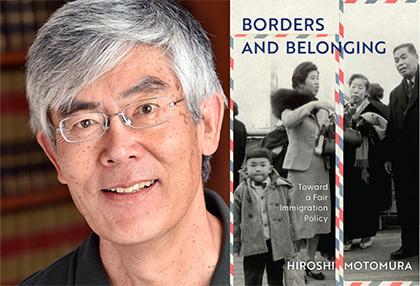Expanding our thinking on immigration law: Hiroshi Motomura talks about his new book

Borders and Belonging: Toward a Fair Immigration Policy (Oxford University Press, 2025) is the third book in UCLA School of Law professor Hiroshi Motomura’s trilogy on immigration law and policy. It offers a comprehensive look at migration, assessing immigration from multiple perspectives and reflecting on the law and larger questions. It follows Motomura’s previous acclaimed books, Americans in Waiting: The Lost Story of Immigration and Citizenship in the United States (Oxford University Press, 2006) and Immigration Outside the Law (Oxford University Press, 2014).
Motomura is among the nation’s most prominent and respected scholars of immigration law. He earned a 2018 Guggenheim Fellowship to conduct his research in the field, including work that went into this volume. He finished the book during a residency at the Rockefeller Foundation’s Bellagio Center in Italy. He is the Susan Westerberg Prager Distinguished Professor of Law at UCLA Law, and he serves as faculty co-director of the law school’s Center for Immigration Law and Policy.
In this edited Q&A, he talks about his personal connection to issues of immigration and citizenship and why “anyone who cares about immigration” could find the book useful in re-thinking and expanding their perspectives on the hot-button topic.
We are always told to not judge a book by its cover – and then there’s the cover of this book. What are we looking at there?
The cover of the book is important personally because it’s a picture of me at the age of three and my mother saying goodbye to her parents on the dock in the port of Yokohama as we were moving to United States. And in many ways, the book is really a story. It's not a personal memoir in any sense, but it's a story, in a broader sense, of questions about borders and belonging that I’ve been asking for much of my life.
Why did you choose to tell this story?
Well, the core message of the book is that the common understanding of immigration law is too narrow. People tend to come from particular political spaces or knowledge bases, and we need to expand the way we think about what immigration law is and what it does.
How, then, does the book cut against the grain?
In many ways, it's hard to capture a single specific argument of the book, because the book tries to look at many ways that conventional views of immigration law are very narrow. Maybe the core message of the book is that we need to think about immigration law differently and more broadly, because it's ultimately how we – people inside the United States – define our society. Immigration law isn't just about the wall. It's about what happens inside communities and whose voices are heard in shaping those communities. So what the book does is that it looks at several questions that are rarely asked together. One example is how we deal with refugees. Another is whether immigrants’ rights are civil rights. Another is what it means to address root causes of migration. Another is the role of history, historical experience, and national memory in making immigration policy. And those are a few of the questions that the book discusses.
Given that everyone seems to have a take on the immigration debate these days, who do you hope will read the book?
The book is certainly for a general audience. It's not just for people who are lawyers. It's not just for people who are immigration specialists. It's for anyone who cares about immigration. Also, it’s not just for people in the United States. The book is about the United States and is largely about the U.S. immigration system, but I'm writing also for people worldwide for whom the United States offers helpful examples.
With the start of the new presidential administration and other recent developments, immigration has already been at the top of the news. What specific issues in this field do you expect to see dominating the conversation as we move along in 2025?
What's going to happen with deportation, what's going to happen with the asylum system, what's going to happen with so-called sanctuary cities - those are all certainly nominations for the most important immigration issue. But, I think that the most fundamental, important immigration issue in 2025 is going to be what version of the American future is going to prevail. A specific part of that issue, which may actually be the most important question, is who is a citizen of the United States. The Trump administration has made it clear that it wants to restrict who is a U.S. citizen. It would mean that many people who were born and have grown up in this country would suddenly not be citizens anymore, and that speaks volumes. And that's not just an immigration issue, it's an issue where immigration and citizenship go to the core of what this country is going to be. And I can think of nothing more fundamental than that.